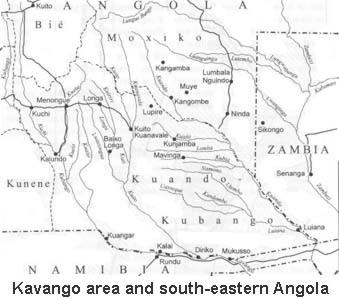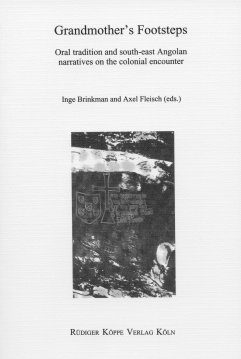

“Grandmother’s Footsteps”
Oral Tradition and South-east Angolan Narratives on the Colonial Encounter
Edited by: Inge Brinkman, Axel Fleisch. Series edited by: Michael Bollig, Wilhelm J.G. Möhlig †.
Series: HSA History, Cultural Traditions and Innovations in Southern Africa Volume 7
1999255 pp.
3 maps, 13 b/w photos, 2 tables, glossary, author and subject index
Text language(s): English
Format: 160 x 240 mm
460 g
Paperback
€ 49.80
Buy '“Grandmother’s Footsteps”' as a downloadable PDF document directly from our online shop »
Order '“Grandmother’s Footsteps”' as print edition »
This collection contains narratives told by Angolan immigrants to Namibia about the Portuguese conquest of Angola. The arrival of the Portuguese is a subject which has been treated in different ways in oral literature among people from south-east Angola. This variety results from the individual creativity of each narrator, and reveals how different sets of oral traditions become embedded in local culture. The nine narrative clusters in the book reveal different local concepts; for example, the nature of colonialism and internal politics, tradition and modernity, and magic and religion.
The editors, formerly members of the Collaborative Research Centre 389 Arid Climate, Adaptation and Cultural Innovation in Africa (1995–2007), University of Cologne/Germany, have combined their linguistic and historical insights to link language in context, strategies of story-telling and the relationships between oral tradition and the past.
Under these links you will find publications by the authors and further studies of the (pre)colonial history of Angola and Namibia:
Accompanying material:
- A War for People
(ISBN 978-3-89645-362-4 ) - Der Caprivizipfel während der deutschen Kolonialzeit 1890–1914
(ISBN 978-3-89645-050-0 ) - Ethnische Grenzen und Frontlinien in Angola
(ISBN 978-3-89645-356-3 ) - Herrschaft, Macht und Einfluß
(ISBN 978-3-89645-359-4 ) - Singing in the Bush
(ISBN 978-3-89645-355-6 ) - Studien zur Geschichte Angolas im 16. und 17. Jahrhundert
(ISBN 978-3-927620-96-4 ) - The Kavango Peoples in the Past
(ISBN 978-3-89645-353-2 )
Cross-reference:
- Alfred Schachtzabels Reise nach Angola 1913–1914 und seine Sammlungen für das Museum für Völkerkunde in Berlin
(ISBN 978-3-927620-21-6 ) - Die ethnographische Sammlung aus Südwest-Angola im Museum von Dundo, Angola (1954). Katalog
(ISBN 978-3-89645-161-3 ) - Die südafrikanische Militärverwaltung (1915–1920) und die frühe Mandatszeit (1920–1936) in der Kavango-Region / Namibia
(ISBN 978-3-89645-360-0 ) - Great Zimbabwe
(ISBN 978-3-89645-210-8 ) - Lucazi Grammar
(ISBN 978-3-89645-038-8 ) - Max Buchners Reise nach Zentralafrika 1878–1882
(ISBN 978-3-89645-160-6 ) - Sprachkulturelle und historische Forschungen in Afrika
(ISBN 978-3-927620-97-1 ) - The Kalahari Ethnographies (1896–1898) of Siegfried Passarge
(ISBN 978-3-89645-141-5 ) - Trommeln in der Kirche
(ISBN 978-3-89645-917-6 ) - Vorkoloniale Geschichte und Expansion der Avungara-Azande
(ISBN 978-3-89645-209-2 )
Reviews
Bei der Präsentation von Oraturen aus Afrika wird sonst häufig auf Traditionsverbundenheit des Erzählers und Authentizität des Erzählten geachtet. [...]
Brinkman und Fleisch schlagen bewußt einen anderen, höchst innovativen Weg ein. Sie präsentieren die Erzählungen von Flüchtlingen, von Personen, die aus ihrem traditionellen Kontext gerissen wurden und deren Erzählungen sich auf eine ferne, als Heimat imaginierte Landschaft beziehen.
Michael Bollig in Fabula, 43/2002, 151-152
The narratives themselves (and their introductions) are precious both as specimens of new forms of oral tradition and as examples of a still little known language congeries. As documents about MPLA indoctrination, they will interest political scientists and historians of this period. Students of oral narrative as literature and as history will focus on the exact way in which personal recollections and local traditions have been fused and the latter given meaning by the dominant framework derived from indoctrination, while linguists will be delighted by the availability of a substantial set of texts [...] about these little known language dialects.
Jan Vansina in International Journal of African Historical Studies, 34/1, 2001, 212-213
David Birmingham in Journal of African History, 43/2002, 372
| « back | Print version | [top] |
 Books
Books Audio
Audio Biographies
Biographies Series
Series Festschrifts
Festschrifts Journals
Journals